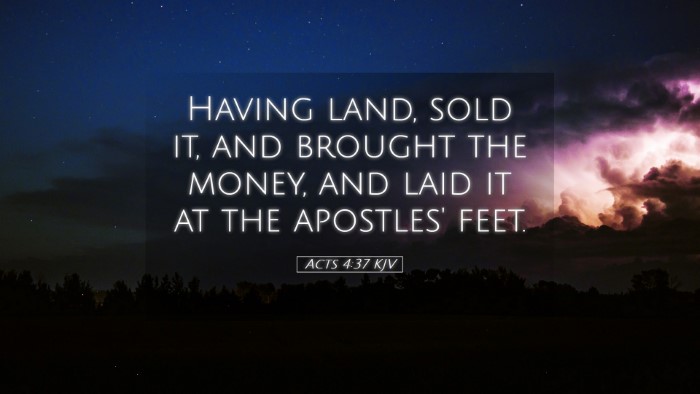Acts 4:37 (KJV): "Having land, sold it, and brought the money, and laid it at the apostles' feet."
Introduction
The passage of Acts 4:37 calls attention to an extraordinary act of generosity within the early church. This act highlights the spirit of community and sharing that characterized the believers' lives. Analyzing this verse reveals significant theological and practical implications for the church today.
Contextual Background
The book of Acts, authored by Luke, serves as a continuation of his Gospel and documents the growth of the early church following Christ's resurrection and ascension. In Acts 4, the apostles are facing opposition but are also experiencing a profound sense of unity. The mention of selling property reflects not only individual commitment but also the collective ethos of communal living that the early believers endorsed.
Analysis of Acts 4:37
The Act of Selling Property
Matthew Henry notes that the sale of property was not a command but a voluntary act stemming from deep faith and love for fellow believers. This negates any notion of coercion within the community. It illustrates a selfless spirit that viewed possessions as secondary to the mission of the church.
Bringing Money to the Apostles
Albert Barnes elaborates on the significance of laying the money at the apostles' feet. This action symbolizes submission and trust in the leadership of the church, as well as a tangible investment in the gathering fellowship. It suggests that the resources given were meant for the common good, reinforcing the idea that believers are stewards of God’s blessings.
Implications for the Early Church
The act of communal sharing was foundational for the early church’s identity. According to Adam Clarke, the radical nature of this behavior was critical for the church's growth and survival amidst persecution. This radical generosity provided for those in need and demonstrated a countercultural community that reflected Christ’s love.
Theological Reflections
-
Faith and Generosity:
Acts 4:37 exemplifies a tangible expression of faith. The act of selling land indicates a prioritization of spiritual over material wealth, urging contemporary readers to examine their own attachment to possessions.
-
Authority and Church Leadership:
By laying the proceeds at the apostles’ feet, the contributors not only displayed obedience but recognized the apostles' authority within the church. This underscores the importance of acknowledging leadership in spiritual matters.
-
Community and Mutual Support:
The close-knit nature of the early church serves as a model for today’s congregations. This example encourages modern believers to support one another, fostering an atmosphere of love and benevolence.
Application for Today’s Church
The principles outlined in Acts 4:37 demand introspection within the church community. How does a congregation today demonstrate generosity? Are members willing to sacrifice personal resources for the sake of the wider community? This ties back to the core tenets of Christianity, emphasizing love, sacrifice, and unity.
Encouraging Generosity
Pastors and church leaders can cultivate a culture of giving by teaching about biblical stewardship. As noted by Barnes, the early church did not view giving as a loss but rather as an investment in the kingdom of God. This perspective is crucial in reshaping the mindset around financial contributions.
Fostering Community
Churches should strive to create environments where members feel encouraged to share their resources—be it time, money, or skills. The communal acts of the early church provide a blueprint for expecting active participation from each member toward the church’s mission and each other’s needs.
Emulating Apostolic Leadership
Lastly, as members bring forth their resources, leaders must handle them wisely and transparently, mirroring the apostles’ practices. Building trust within the congregation will cultivate an eagerness to support the church’s vision and outreach efforts.
Conclusion
Acts 4:37 is not merely a historical account of early church practices; it embodies principles of faith, leadership, and community that resonate powerfully today. The invitation from this passage is to reflect on how contemporary congregations can implement these lessons, striving toward a spirit of unity and radical generosity that honors Christ and His mission.


